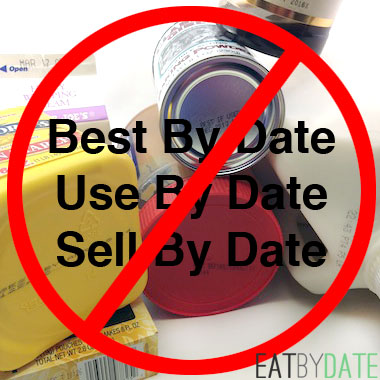Don't Throw It Out Yet!

A lot of people, including myself, won’t use a food item if it’s past its expiration date. But a new study has shown that a lot of foods are being thrown out prematurely because consumers are confused at what expiration dates actually mean. Most of us think that the expiration dates on food indicate how safe the food is to consume, but these dates aren’t actually related to the risk of food poisoning or foodborne illness.
Putting dates on food emerged in the 1970’s as a result of consumer demand to know how their food was made. The expiration dates solely indicate freshness and are put on cans to convey when the product is at its peak. So what does that mean? It means that the food doesn’t expire in the sense of becoming inedible necessarily. The packaging on dates is also voluntary; there is no law that requires companies to label their food. Foods last for a significantly longer amount of time than the expiration date would suggest. Hopefully this small guide will help you stop wasting food. It helped me.
The Terms:
Use by and Best by: These are intended for consumer use, but are typically the date the manufacturer deems the product to reach peak freshness. It does not indicate spoilage, or signal that the food is no longer safe to eat. The best way to gauge whether the food is good or not is to smell and examine it first. If there is no discoloration or odd smells it’s probably still safe to eat.
Sell by: This date is intended to only help manufacturers and retailers, not consumers. The date is a guide for stores to know how long they can display a particular product. As a consumer you should buy the product before this date, but you can still store it at home beyond the date.
Expires on: You’ll find this label on infant formula and some baby foods, which are the only food products the federal government regulates with regard to dating. Be sure to use the product before the expiration date has passed.
Food Guide:
Canned Goods: Expiration dates on canned foods can range from 1 to 4 years, but if you keep the food in a cool, dark place and make sure the can is undented and in good shape you can most likely, safely double the shelf life from 3 to up to 6 years. The canned foods are vacuum sealed to prevent bacterial contamination so it’s likely that if you have a canned item from 3 years ago, it’s still okay.
Frozen Foods: Frozen foods are pretty much expiration-proof because they’re frozen. There is one exception to that rule though-meats.
Meats: It’s recommended that you eat lunch meats three to five days after you buy them, but if you freeze them they can last up to two months. Beef stew meat can be used after nine months in the freezer. Food poisoning bacteria does not grow in the freezer, so it doesn’t’ matter how long a food is frozen, it is safe to eat. Granted the foods that have been in the freezer for moths might by dry, or may not taste as good, but they are safe to eat.
Eggs: I seem to always have a problem telling when eggs are bad or not. Put the egg in a bowl of water, if it floats the bacteria in the egg is too high and it is unsafe to eat. Eggs can be consumed three to five weeks after purchase. If you keep them refrigerated they are still fresh three to five weeks after you buy them.
Pasta: Because pasta is dry it’s hard to spoil, as long as it doesn’t look weird or smell funny you can still use that expired pasta.
Bread: If you put your bread in the fridge or freezer you can keeper for much longer than the expiration date says. As long as the bread isn’t dry or doesn’t have mold you should be good.
Apples: If you keep apples in the fridge they have a pretty long shelf-life. An apple with stay fresh and crisp for three weeks in the fridge. If an apple is cooked and then frozen it will stay just as tasty for eight months.
Other Fruits and Veggies: Use common sense and store in the fridge. As long as there is no mold, they aren’t dried out or squishy it’s probably safe to eat.
Cereal: Cereal in boxes or bags, ready-to-eat cereal, can last on your shelf for six to 12 months without going stale. If you do leave the bag open your cereal might get stale and not taste as good, but eating it won’t hurt you.
Packaged greens: I’m not a fan of wilting lettuce, but it is still safe to eat as long as it’s not decaying. Food experts suggest soaking the lettuce in ice water for 10 minutes.
Milk: Pasteurized milk will keep 50% longer if you store it at a lower temperature, so store it at the back of the fridge rather than the fridge door. It’s usually okay a week after the “sell by” date.
The best advice given by food professionals is to use common sense and store things properly!
- https://www.foxnews.com/health/2014/03/16/which-expired-foods-are-okay-to-eat/
- https://healthland.time.com/2013/09/18/is-your-food-expired-dont-be-so-quick-to-toss-it/
- https://www.bbcamerica.com/anglophenia/2013/04/british-crisps/
- https://www.latimes.com/food/dailydish/la-dd-10-foods-safe-eat-past-expiration-date-20140318-story.html
- https://www.stilltasty.com/articles/view/5
- https://www.npr.org/blogs/thesalt/2012/12/26/167819082/dont-fear-that-expired-food
- https://www.webmd.com/a-to-z-guides/features/do-food-expiration-dates-matter?page=2
- https://www.eatbydate.com/wp-content/uploads/Date-2-large.jpg
 Whitney Saupan
Whitney Saupan
Weekly Newsletter Contributor since 2013
Email the author! whitney@dvo.com
